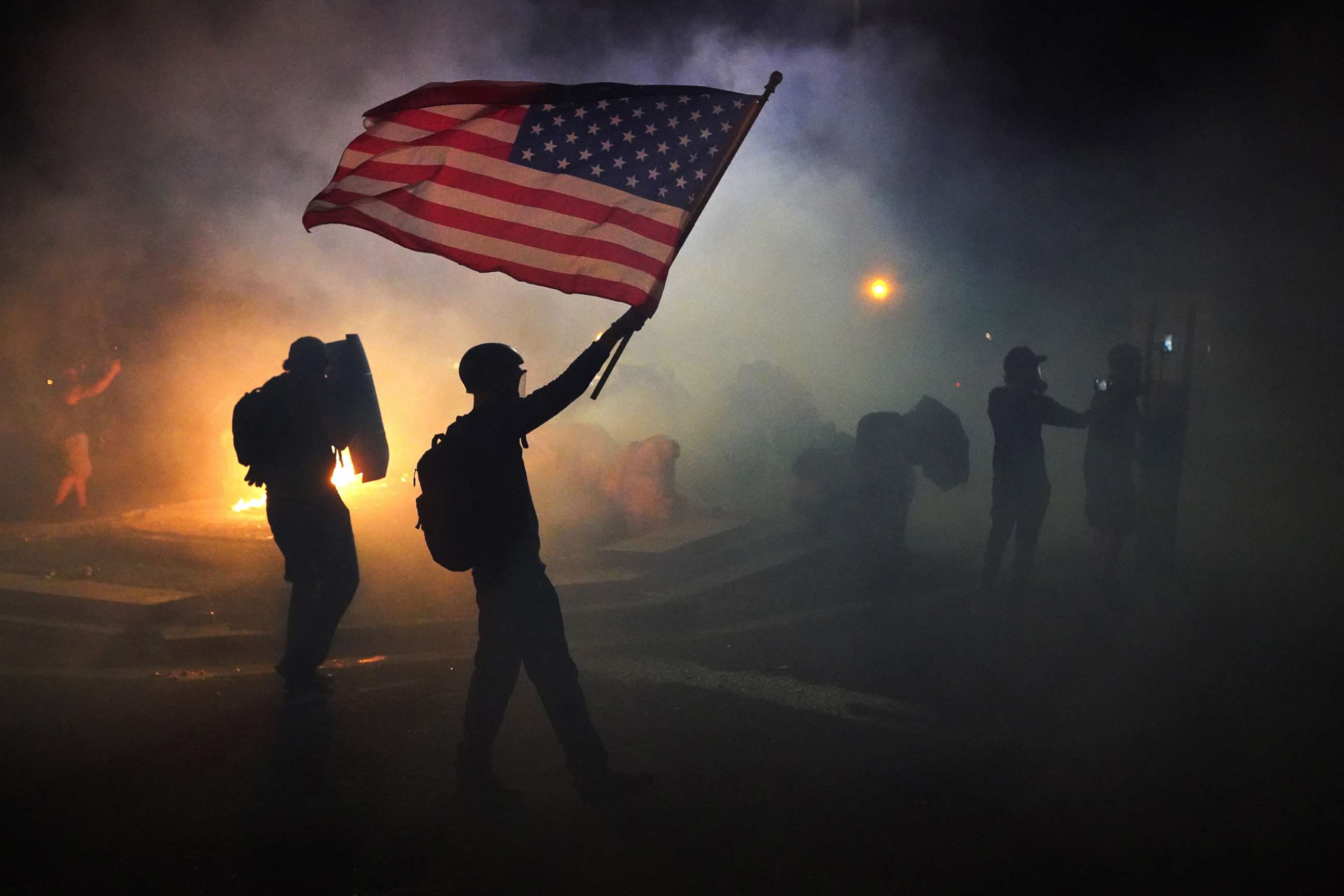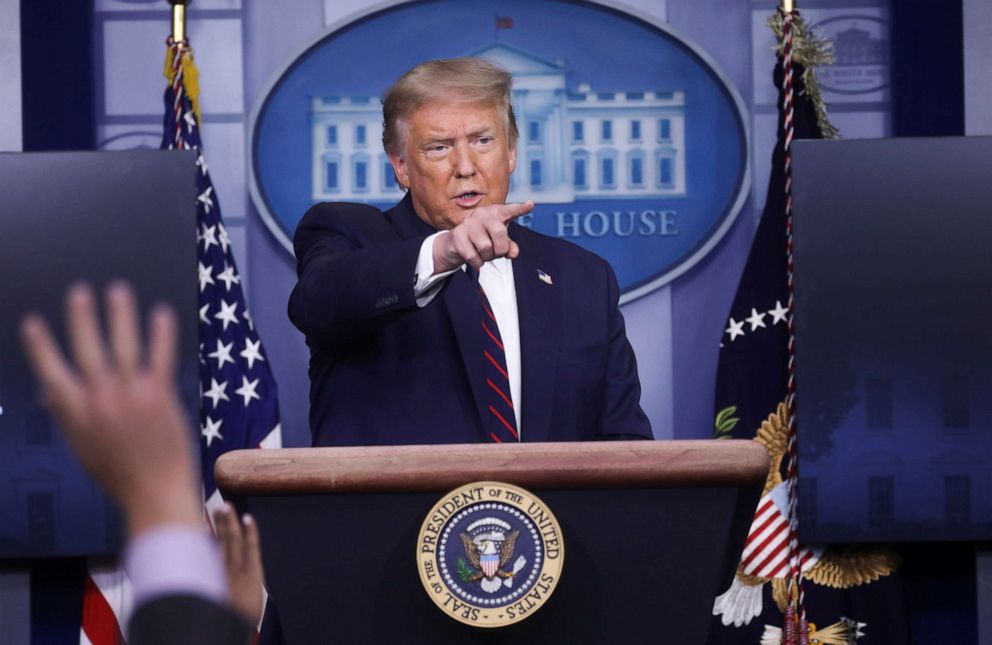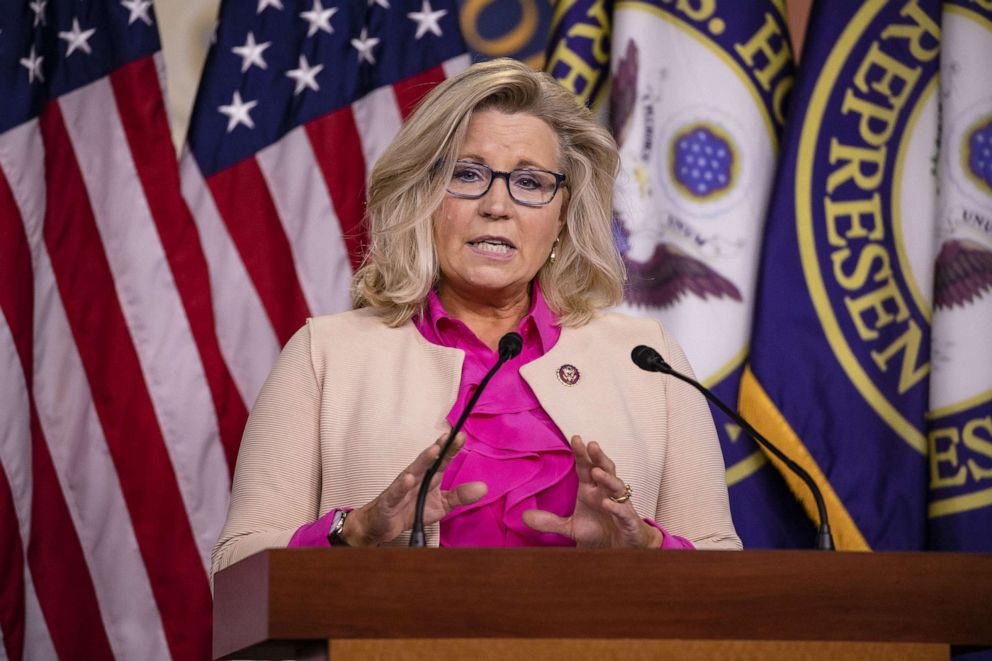The Note: Trump takes fight to cities in battle for suburbs
A poll this week saw Joe Biden with an edge on handling crime and safety.
The TAKE with Rick Klein
The battle for the suburbs would appear to run through the cities. It actually looks like a battle at the moment, too.
The remarkable federal crackdown playing out in Portland, Oregon -- with threats of much more to come in other cities -- speaks more to President Donald Trump's reelection strategy than anything surrounding his COVID-19 response at the moment.
Trump has taken the protests that have played out in Portland for weeks and sought to portray them into a direct threat to the nation. In case that doesn't seem political barely 100 days before the election, he is arguing that scenes playing out during his own presidency would be more widespread in former Vice President Joe Biden's America.
It’s a theme the president plans to address Wednesday afternoon, with a White House speech planned on what is being called “Operation Legend” -- named after a 4-year-old boy killed in Kansas City, Missouri, last month.

"This is worse than anything anyone's ever seen," the president said Monday. "And you know what? If (Joe) Biden got in, that would be true for the country. The whole country would go to hell."
It's a message Trump's campaign is reinforcing with a series of ads that falsely claim that Biden supports efforts to "defund" police departments.
This week's ABC News/Washington Post poll saw Biden with an edge on handling crime and safety, among a range of other issue areas. The poll also found wide support for the Black Lives Matter movement -- though not necessarily for some of the policy goals espoused by leaders of that movement.
The real test for Trump will be if he makes good on his threat to send federal agents into cities where mayors have specifically said that will make matters more tense -- and potentially violent. He has mused about ordering what he did in Portland in places including New York, Philadelphia, Detroit, Baltimore and Chicago.
"We do not welcome dictatorship," Chicago Mayor Lori Lightfoot said Tuesday. "We do not welcome authoritarianism. And we do not welcome unconstitutional arrest and detainment of our residents."
The current use of federal agents -- many of them not showing agency identification -- has brought unwelcome comparisons to totalitarian regimes of decades past. It's also a particular challenge to Republicans, who have decried expansions of federal authority under previous presidents.
Trump has already linked his orders to the campaign against Biden. His hope is that voters make the same links -- even in a time of a pandemic.
The RUNDOWN with Alisa Wiersema
"It will probably, unfortunately, get worse before it gets better," Trump conceded Tuesday during his first coronavirus briefing since April.
The comment demonstrated a significant change in the president's portrayal of the severity of the moment, but even as Americans grapple with lagging testing availability, rocky schooling plans and growing economic constraints, the president's shift was not accompanied by any kind of concrete plan for what comes next.
On Capitol Hill, the current outlook over stimulus negotiations does not currently appear to be any better as Republicans struggle to find consensus on the contents of the next coronavirus relief package, which they say will be limited at about $1 trillion in funds. Although Senate Majority Leader Mitch McConnell said the proposal should be unveiled this week, on Tuesday, Republicans who joined him for a closed-door meeting with Treasury Secretary Steven Mnuchin and White House Chief of Staff Meadows, said the discussion got heated as some senators grew frustrated with the demands from the Trump administration.

However, on the heels of the meeting, Sen. Roy Blunt said progress had been made in terms of allocating funding for more coronavirus testing. Even so, the Missouri senator noted that a clear agreement on the exact level of funding would still have to be approved by the president.
"I think that we are doing a tremendous amount of testing. But if the -- if the doctors and the professionals feel that even though we're at a level that nobody ever dreamt possible, that they would like to do more, I'm okay with it," Trump said on Tuesday.
An increase in available testing could provide a crucial resource for Americans looking at the prospect of balancing personal safety with economic constraints as pandemic benefits are set to expire over the coming weeks. With the deadlines looming on the horizon, this week's negotiations -- as well as the president's comments -- could demonstrate how rhetoric cannot outweigh tangible policies.
The TIP with Kendall Karson
The battle for the House is expected to be contentious, particularly for Republicans who are seeking to corrode the Democrats' 40-seat edge. But before the anticipated fireworks in November, the fractures within the Republican caucus appeared all-consuming at a GOP conference meeting on Tuesday, the first in months.
Multiple Republicans -- most members of the conservative House Freedom Caucus -- ripped into Rep. Liz Cheney, the No. 3 ranking Republican and the most senior female Republican in the House, for breaking with Trump in recent months, including over his administration's response to the coronavirus and for backing Dr. Anthony Fauci, the nation's top infectious disease expert who saw the White House turn on him in recent weeks.

Rep. Matt Gaetz, R-Fla., demanded that Cheney "step down or be removed" as conference chair -- a call that quickly prompted a warning from the president's son, Donald Trump Jr., who chimed in saying, "We already have one Mitt Romney, we don't need another." Sources told ABC News that Cheney held her own amid the incoming fire, and she told reporters after the meeting that there was "a healthy exchange of views" and it is clear "we are all unified in recognizing the danger the country would face if Joe Biden were elected president." House Minority Leader Kevin McCarthy, unprompted, threw his support behind Cheney, telling reporters she does "an amazing job."
Any chance of taking back the House will not be aided by friendly fire, especially as Republicans face a continued deficit in the money race -- with Democrats' campaign arm outraising their GOP counterpart by nearly $4 million in the last fundraising quarter and reporting a $33 million advantage in the bank.
THE PLAYLIST
ABC News' "Start Here" podcast. Wednesday morning's episode features ABC News Chief White House correspondent Jonathan Karl, who recaps the first 'rebooted' White House coronavirus briefing. Then, ABC News' Katherine Faulders updates us on stimulus package negotiations in Congress. And, ABC News' Kayna Whitworth and Terry Moran explain why standoffs between protesters and federal troops could soon materialize in other cities. http://apple.co/2HPocUL
ABC News' "Powerhouse Politics" podcast. Former United States Secretary of Homeland Security Michael Chertoff discusses election security and the role of DHS with ABC News Political Director Rick Klein and Chief White House Correspondent Jonathan Karl. https://bit.ly/2w091jE
FiveThirtyEight Politics Podcast. A recent Monmouth poll showed that a majority of Pennsylvanians -- 57% -- believe there are "secret" voters in their communities who support President Donald Trump but won't tell anyone about it. In this installment of the FiveThirtyEight Politics podcast, the crew explains why that is unlikely. They also consider the future of Black politics as politicians who were leaders of the civil rights movement, like Rep. John Lewis, die or leave office. Plus, they check in on the state of the race for the Senate. https://53eig.ht/3hnrewO
WHAT YOU NEED TO KNOW TODAY




